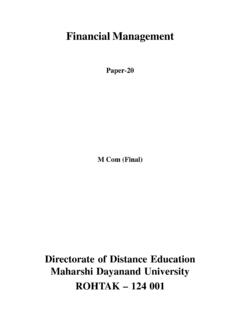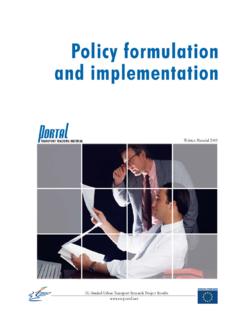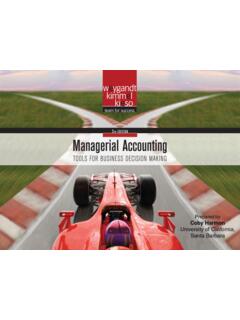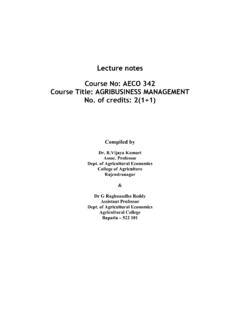Transcription of Financial Management
1 Financial ManagementPaper-20M Com (Final)Directorate of Distance EducationMaharshi Dayanand UniversityROHTAK 124 001jktuhfr foKku2 Copyright 2004, Maharshi Dayanand University, ROHTAKAll Rights Reserved. No part of this publication may be reproduced or stored in a retrieval systemor transmitted in any form or by any means; electronic, mechanical, photocopying, recording orotherwise, without the written permission of the copyright Dayanand UniversityROHTAK 124 001 Developed & Produced by EXCEL BOOKS PVT. LTD., A-45 Naraina, Phase 1, New Delhi-110028 Qklhokn3 CONTENTSC hapter-1:Introduction to Financial Management5 Chapter-2:Cost of Capital25 Chapter-3:Operating and Financial Leverage77 Chapter-4:Capital Budgeting94 Chapter-5:Capital budgeting Evaluation Techniques112 Chapter-6:Capital budgeting under Risk and Uncertainties130 Chapter-7:Working Capital Management165 Chapter-8:Cash Management and Marketable Securities196 Chapter-9: Management of Receivables223 Chapter-10:Inventory Management244 Chapter-11:Capital Structure Theories262 Chapter-12:Dividend Decisions330 Chapter-13:Working Capital Financing346 Chapter-14:Regulation of Bank Finance380jktuhfr foKku4 Financial MANAGEMENTMCom (Final)Paper-20M.
2 Marks : 100 Time : 3 :There will be three sections of the question paper. In section A there will be 10 short answer questionsof 2 marks each. All questions of this section are compulsory. Section B will comprise of 10 questionsof 5 marks each out of which candidates are required to attempt any seven questions. Section C will behaving 5 questions of 15 marks each out of which candidates are required to attempt any three examiner will set the questions in all the three sections by covering the entire syllabus of theconcerned InputsUNIT IEvaluation of Finance, Objectives of the Firm-Profit Max, And Wealth Max, Functions of FinancialManagement, Organisation of the Finance Function, Cost of Capital: Definition and Concepts,Measurement, the weighted average cost of Capital; Leverage: Operating and Financial , IICapital budgeting , Meaning, Importance, Rational of Capital Budget, Nature of InvestmentDecision, The Administrative framwork, methods of appraisal, Capital Rationing, Inflation andCapital budgeting .
3 Capital budgeting underRisk and IIIW orking Capital Management , Concept, Need, Determinants, Finance mix for working capital,Estimating working capiktal needs, Cash Management ; The Cash Budget, Techniques of cashmanagement and marketable securities; Management of reseivables; Objectives, Factors affectingpolicies for managing accounts receivables; Inventory Management ; Objectives, InventoryManagement IVFinancing Decisions: Capital Structure Theories, taxation and capital structure; Planning thecapital structure, Factors affecting capital structure, anslysis, ROI-ROE analysis,Assessment of Debt Capacity, Capital Structure Policies in Decision: Theories of Dividends-traditional position, Gordon Model, Walter model, , Radical Model, Factors affecting dividend policy, stock dividends and stock splits,Repurchase of stock procedural and legal aspects of VSources of Working Capital Funds: Accurals, trade, credit, commercial banks advances, publicdeposits, Inter corporate deposits, short term loans from Financial institution, right debentures forworking capital, commercial papers and of Bank Finance.
4 -Recommendations of Latest to Financial ManagementChapter-1 Introduction to Financial ManagementCompanies do not work in a vacuum, isolated from everything else. It interacts andtransacts with the other entities present in the economic environment. These entitiesinclude Government, Suppliers, Lenders, Banks, Customers, Shareholders, etc. whodeal with the organisation in several ways. Most of these dealings result in either moneyflowing in or flowing out from the company. This flow of money (or funds) has to bemanaged so as to result in maximum gains to the this flow of funds efficiently is the purview of finance. So we can definefinance as the study of the methods which help us plan, raise and use funds in anefficient manner to achieve corporate objectives. Finance grew out of economics as aspecial discipline to deal with a special set of common corporate Financial objectives could be the link between the business and the other entities in the and Financial decision makingLet us first look at what we mean by investment and Financial decision Decision: The investment decision, also referred to as the capitalbudgeting decision, simply means the decisions to acquire assets or to invest in aproject.
5 Assets are defined as economic resources that are expected to generatefuture Decision: The second Financial decision is the financing decision,which basically addresses two much capital should be raised to fund the firm's operations (both existing& proposed) is the best mix of financing these assets?Financing could be through two ways: debt (loans from various sources like banks, Financial institutions, public, etc.) and equity (capital put in by the investors who are alsoknown as owners/ shareholders). Shareholders are owners because the shares representthe ownership in the Management6 Funds are raised from Financial markets. Financial markets is a generic term used todenote markets where Financial securities are teat. These markets include moneymarkets, debt market and capital markets.
6 We will understand them in detail later in the3rd and investing decisions are closely related because the company is going toraise money to invest in a project or assets. Those who are going to give money to thecompany (whether lenders or investors) need to understand where the company isinvesting their money and what it hopes to earn from the investments so that they canassure themselves of the safety of their questions that you may thinking about right now are "Why do we need to learnfinance? Shall we not leave it to the people who are going to specialise in finance?Finance won't help me in the area that I am going to work in, so why learn?" This is tosay that the knowledge of finance does not add any value to you. Is it so? Think aboutit. When you get your pocket money from your parents, you do not go out and blow thewhole lot in one day because if you do, your parents are not going to give you moremoney to last through that month.
7 You quickly learn that you need to plan your expenditureso that the money lasts throughout the month and you may actually plan to save someof it. Those who do not get enough to meet their requirements, think about some clevermeans to raise more money (like falling sick!). Alternatively if they need more moneyfor the month because of certain special events (like Valentine's day) they can plan toborrow money for a month and repay in the next you plan, raise and efficiently utilise funds that are your disposal (or at least try to).That a business organisation also needs to do the same can hardly be scale of operations is much bigger and to efficiently manage funds at this scale,decisions cannot be taken without sound methodology. Finance teaches you managing these funds the first thing you would need is information.
8 Externalinformation has to be collected from the environment and accounting provides internalinformation about the firm's operations. Accounting can be defined as an informationand measurement system that identifies, records, and communicates relevant informationabout a company's economic activities to people to help them make better would now agree that a company needs to manage its own funds efficiently butyour question still remains "Why am I concerned with it?" Further arguing, you say that,"I am going to specialise in Marketing/ Information Technology/ Human ResourceManagement/ Operations Management and there is no need for me to learn Finance is a separate function in my organisation (or the organisation that I amgoing to work for) and I am hardly going to use finance to work in my respectivedepartment.
9 "7 Introduction to Financial ManagementThink again. Everything that you do has an impact on the profitability of the company(including drinking ten cups of coffee in a day!). So if you want to grow up to be theCEO of the company in a few years from now (which I undoubtedly think that youwould love to) you should take the advice of the top per cent of the top CEOs rate Finance skills, as the most required forthe CEO of the surveyBetter take the CEOs advice. But don't get the feeling that only the CEOs require theFinance Skills, all other functions of Management also cannot do without finance andthe Financial of FinanceThe academic discipline of Financial Management may be viewed as made up of fivespecialized fields. In each field, the Financial manager is dealing with the managementof money and claims against money.
10 Distinctions arise because different organizationspursue different objectives and do not face the same basic set of problems. There arefive generally recognized areas of Finance. Central, state and local governments handle large sums ofmoney, which are received from many sources and must be utilized in accordancewith detailed policies and procedures. Governments have the authority to taxand otherwise raise funds, and must dispense funds according to legislative andother limitations. Also, government do not conduct their activities to achieve thesame goals as private organizations. Businesses try to make profits, whereas agovernment will attempt to accomplish social or economic objectives. As aresult of these and other differences, a specialized field of public finance hasemerged to deal with government Financial and Investment Analysis.







